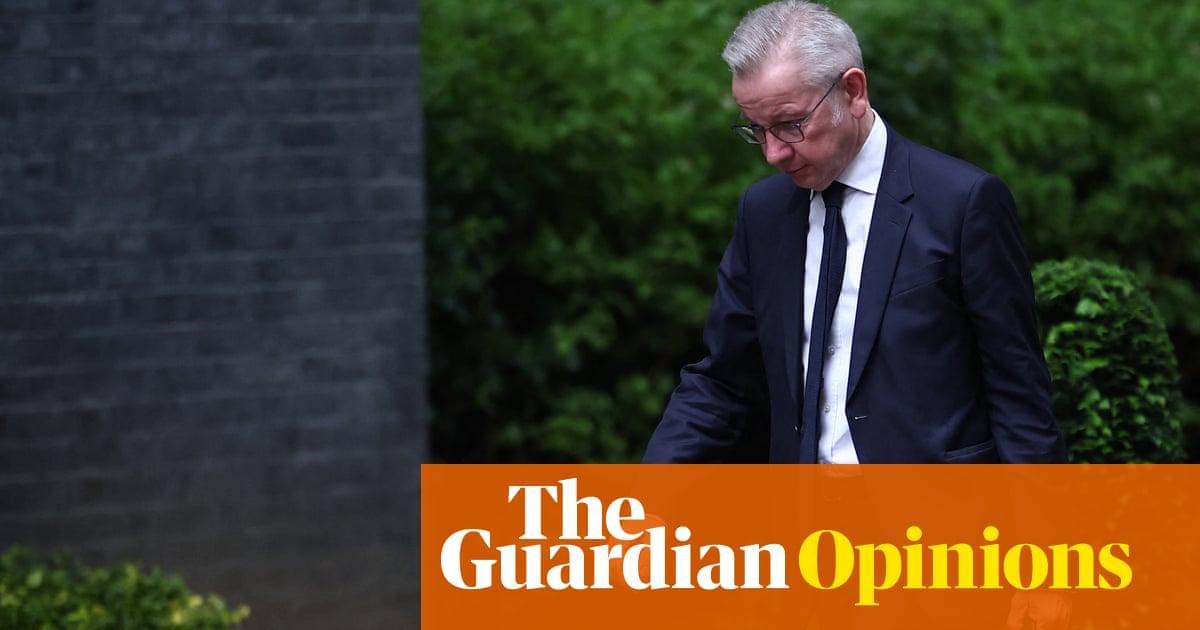
hat a strange, head-spinning moment this is. The news is awash with reports of queues at the ports, the stockpiling of food and medicines and a government committee charged with “exit operations”, but the plain political fact that sits under everything is in a surreal league of its own. Amid an unprecedented pandemic that blurs into an equally unprecedented economic and social crisis, Britain has a government more than prepared to take the deranged option of inflicting even more disaster on its own country. Everything remains uncertain; both sides say the chances of a trade deal remain slim.
As a reminder of the stupidity and arrogance that got us into this mess, the Conservatives and their cheerleaders in the press are inevitably blaming the supposedly vengeful Europeans. Of late, some people have even been heard alleging that some of the responsibility lies with remainers who refused to back a softer Brexit in parliament. The truth, of course, is that leaving the EU in this chaotic way is the work of the pro-Brexit right: not the result of other people’s failings, but its own conscious designs.
The future this country is limping into has its roots in whole centuries of myth, emotion and the kind of national delusions on vivid display in last week’s headlines about scaring French fishermen with the aid of gunboats. But, clearly, to understand the history of Brexit demands close study of the Conservative party, and its 40-year transformation from a cautious, risk-averse institution to the unstable political force it has become. This is the key political story of the last half-century, and some of its most important chapters centre on one person in particular, currently being played by Gillian Anderson in The Crown, and arguably at the heart of national events even 30 years after she left office.
In 1988, Margaret Thatcher gave the legendary speech in Bruges that effectively launched modern Tory Euroscepticism by warning of the concentration of power “at the centre of a European conglomerate”. Its pithiest statement still stands as most Conservative Brexiteers’ basic credo: “We have not successfully rolled back the frontiers of the state in Britain only to see them reimposed at European level, with a European super-state exercising a new dominance from Brussels.”
Two years later, after her party had replaced her with John Major, Thatcher had lunch with an adviser-turned-writer called George Urban, and mused on her own mixture of free-marketry and strident nationalism, and a transformation of Toryism that she thought was incomplete. “We are not a ‘conservative’ party,” she said, “we are a party of innovation, of imagination, of liberty, of striking out in new directions, of renewed national pride and a novel sense of leadership … That’s not ‘conservative’. The name is all wrong.” If you want to grasp the mindset that has led Britain to this point, this is where you have to start.
Thatcher’s 10-year upturning of Britain was predicated on the return of a prosperity that, for some people, actually materialised. But her Brexit-supporting successors have so embraced the politics of restless radicalism that they have moved their party squarely into the realm of abstract ideas and distant utopias. The most honest statement of why Tories so fervently believe in leaving the EU, whatever the cost, was Jacob Rees-Mogg’s claim in 2018 that “the overwhelming opportunity for Brexit is over the next 50 years”. This is the kind of fanatical belief rarely heard in the democratic mainstream: we are all now living with the terrifying consequences of it.
Over the last few weeks, I have been immersed in Conservatism: The Fight for a Tradition, a sweeping new work of political history by the former Economist journalist Edmund Fawcett. It draws to a close with the latter-day arrival of what he calls the “hard right”, and highlights its footing in two starkly different ideological strands that some Tory Brexiteers apparently manage to believe in simultaneously. “Economic liberalism and nationalism point, intellectually, in opposite directions,” he writes. “The first is open-bordered and global; the second, sheltering, exclusive and shut-in. Both, however, when supercharged as “hyper” and “ultra”, serve to abandon right-wing centrism.” Each strand wants to “leave the liberal centre, but by different exits”. They share, he writes, “a destructive common purpose strong enough to conceal their differences, but with no promise of a stable alternative”.
This is where Britain now is. Brexit has turned out to be like most revolutions: it has destroyed things but offered very little to put in their place. How will we possibly manage both exiting Europe and the long tail of the coronavirus? What about the growing budget deficit – once the justification for 10 years of austerity – and the prospect of even more diminished tax revenues? What will become of “levelling up”? Inevitably, no one knows: when confronted with the complexities of reality, revolutionaries usually don’t.
The central question of politics in the coming months and years will be how much people are prepared to put up with in the cause of a specious idea of “sovereignty”. The Covid crisis has once again proved that Britain does not have an economy that can absorb shocks and crises of confidence. There will be no furlough for those who suffer the consequences of withdrawn investment or the relocation of multinationals.
One of the most wretched cliches of post-referendum commentary is the idea that many of the places that voted for Brexit had nothing to lose: something disproved by, say, aviation and aerospace in south Wales, the automotive industry of the north-east of England, or any number of small- and medium-sized businesses that tick over in so-called “left behind” places, barely noticed by outsiders. The 17% of Britons currently reckoned to support a no-deal exit may generate a lot of noise, but there are still such things as direct material interests, and no politician is going to endear themselves by insisting that accepting job losses and pay cuts is the highest form of patriotism.
In the vaguest kind of way, Johnson – a rebel leader who only attached himself to the revolution as a matter of expediency – may just about understand this. But he knows he has satisfy his party, which constantly looks for new wars to wage and fresh things to smash (and new leaders to topple). What it will end up creating in the wake of this moment will be like the Britain Thatcher bequeathed us, only more so: shabby, fearful and run by people who keep telling us that if we only work harder and dream bigger, something world-beating will sooner or later materialise.
The right of British politics once presented itself as the antidote to such reckless schemes: now, it is the driver of them. Here, perhaps, lies the key to what might eventually follow the Brexit era, and a possible counter-revolution. Amid all the wreckage, any up-and-coming Tory with their eye on the future might want to start quietly plotting the revival of the conservatism their party has so comprehensively left behind.
• John Harris is a Guardian columnist












